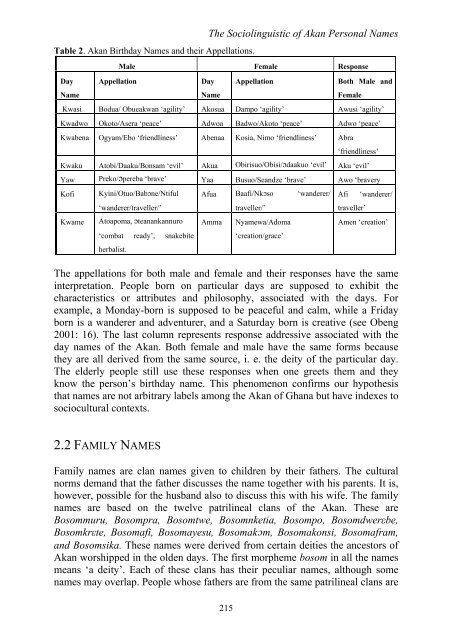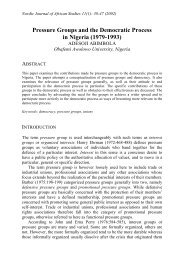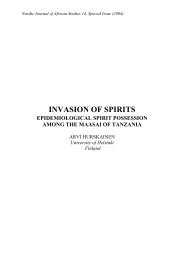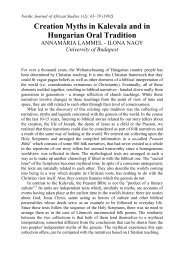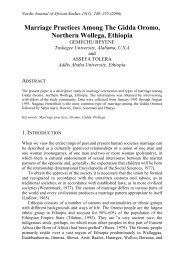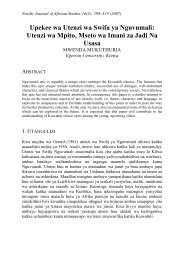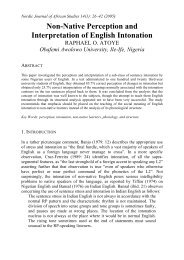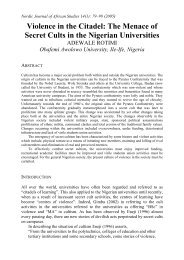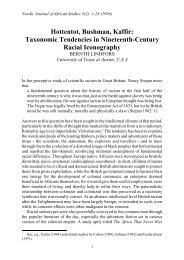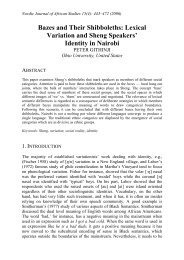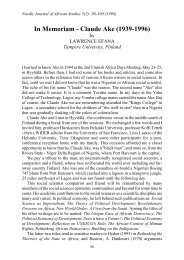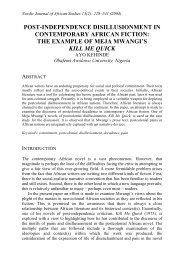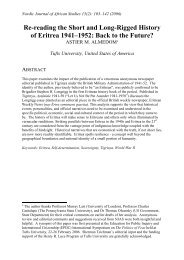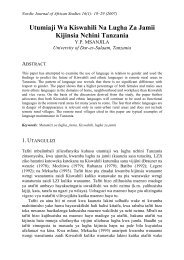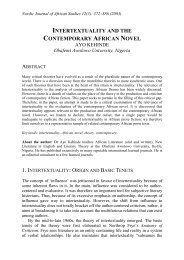The Sociolinguistic of Akan Personal Names - Nordic Journal of ...
The Sociolinguistic of Akan Personal Names - Nordic Journal of ...
The Sociolinguistic of Akan Personal Names - Nordic Journal of ...
You also want an ePaper? Increase the reach of your titles
YUMPU automatically turns print PDFs into web optimized ePapers that Google loves.
Table 2. <strong>Akan</strong> Birthday <strong>Names</strong> and their Appellations.<br />
Day<br />
Name<br />
<strong>The</strong> <strong>Sociolinguistic</strong> <strong>of</strong> <strong>Akan</strong> <strong>Personal</strong> <strong>Names</strong><br />
Male Female Response<br />
Appellation Day<br />
Name<br />
Appellation Both Male and<br />
Female<br />
Kwasi Bodua/ Obueakwan ‘agility’ Akosua Dampo ‘agility’ Awusi ‘agility’<br />
Kwadwo Okoto/Asera ‘peace’ Adwoa Badwo/Akoto ‘peace’ Adwo ‘peace’<br />
Kwabena Ogyam/Ebo ‘friendliness’ Abenaa Kosia, Nimo ‘friendliness’ Abra<br />
‘friendliness’<br />
Kwaku Atobi/Daaku/Bonsam ‘evil’ Akua Obirisuo/Obisi/�daakuo ‘evil’ Aku ‘evil’<br />
Yaw Preko/�pereba ‘brave’ Yaa Busuo/Seandze ‘brave’ Awo ‘bravery<br />
K<strong>of</strong>i Kyini/Otuo/Bab�ne/Ntiful<br />
Kwame<br />
‘wanderer/traveller/’<br />
Atoapoma, �teanankannuro<br />
‘combat ready’, snakebite<br />
herbalist.<br />
Afua Baafi/Nk�so ‘wanderer/<br />
traveller/’<br />
Amma Nyamewa/Adoma<br />
‘creation/grace’<br />
Afi ‘wanderer/<br />
traveller’<br />
Amen ‘creation’<br />
<strong>The</strong> appellations for both male and female and their responses have the same<br />
interpretation. People born on particular days are supposed to exhibit the<br />
characteristics or attributes and philosophy, associated with the days. For<br />
example, a Monday-born is supposed to be peaceful and calm, while a Friday<br />
born is a wanderer and adventurer, and a Saturday born is creative (see Obeng<br />
2001: 16). <strong>The</strong> last column represents response addressive associated with the<br />
day names <strong>of</strong> the <strong>Akan</strong>. Both female and male have the same forms because<br />
they are all derived from the same source, i. e. the deity <strong>of</strong> the particular day.<br />
<strong>The</strong> elderly people still use these responses when one greets them and they<br />
know the person’s birthday name. This phenomenon confirms our hypothesis<br />
that names are not arbitrary labels among the <strong>Akan</strong> <strong>of</strong> Ghana but have indexes to<br />
sociocultural contexts.<br />
2.2 FAMILY NAMES<br />
Family names are clan names given to children by their fathers. <strong>The</strong> cultural<br />
norms demand that the father discusses the name together with his parents. It is,<br />
however, possible for the husband also to discuss this with his wife. <strong>The</strong> family<br />
names are based on the twelve patrilineal clans <strong>of</strong> the <strong>Akan</strong>. <strong>The</strong>se are<br />
Bosommuru, Bosompra, Bosomtwe, Bosomnketia, Bosompo, Bosomdwerεbe,<br />
Bosomkrεte, Bosomafi, Bosomayesu, Bosomak�m, Bosomakonsi, Bosomafram,<br />
and Bosomsika. <strong>The</strong>se names were derived from certain deities the ancestors <strong>of</strong><br />
<strong>Akan</strong> worshipped in the olden days. <strong>The</strong> first morpheme bosom in all the names<br />
means ‘a deity’. Each <strong>of</strong> these clans has their peculiar names, although some<br />
names may overlap. People whose fathers are from the same patrilineal clans are<br />
215


